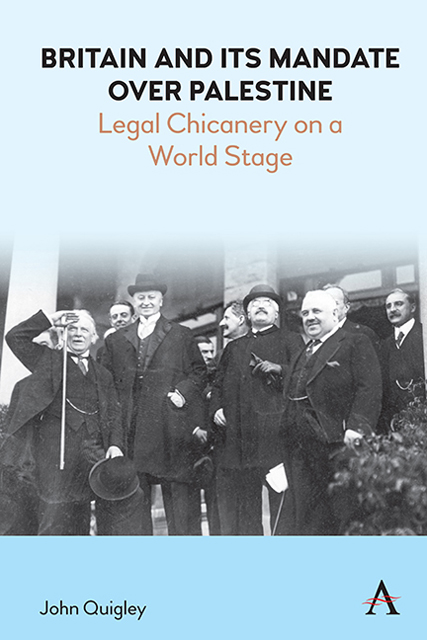Book contents
- Frontmatter
- Contents
- Preface
- Setting the Stage: Was Britain’s Rule in Palestine Legal?
- 1 The Balfour Declaration Is the Focal Point for the Legal Situation of Palestine
- 2 The Balfour Declaration Was a Binding Commitment to the Jewish People
- 3 The Jewish National Home Meant a Jewish State
- 4 The Balfour Declaration Was Issued to Affirm Jewish Rights in Palestine
- 5 The Paris Peace Conference Raised Jewish Statehood to the International Level
- 6 Britain’s Allies Made the Balfour Declaration an International Commitment
- 7 Britain’s Allies Endorsed Jewish Rights
- 8 Britain Took on Palestine Because of the League’s Mandate System
- 9 The League of Nations Protected Palestine’s Arab Population
- 10 Britain Was Given Palestine by the League of Nations
- 11 The League of Nations Put the Palestine Mandate into Legal Force
- 12 The Peace Treaty with Turkey Legalized Britain’s Status in Palestine
- 13 The Palestine Mandate Document Was a Treaty between Britain and the League
- 14 The League of Nations Required Britain to Implement the Balfour Declaration
- 15 The Palestine Mandate Document Implemented the League Covenant
- 16 The Palestine Mandate Document Recognized Jews as a National Group
- 17 The Palestine Mandate Document Bound Britain to the Balfour Declaration
- 18 The International Community Committed Itself to the Balfour Declaration
- 19 Britain Held Legal Status in Palestine
- 20 The United Nations Charter Carried Forward a Jewish Entitlement to Statehood
- Postscript: Why History Matters
- Documents Annex
- Notes
- Bibliography
- Index
15 - The Palestine Mandate Document Implemented the League Covenant
Published online by Cambridge University Press: 10 January 2023
- Frontmatter
- Contents
- Preface
- Setting the Stage: Was Britain’s Rule in Palestine Legal?
- 1 The Balfour Declaration Is the Focal Point for the Legal Situation of Palestine
- 2 The Balfour Declaration Was a Binding Commitment to the Jewish People
- 3 The Jewish National Home Meant a Jewish State
- 4 The Balfour Declaration Was Issued to Affirm Jewish Rights in Palestine
- 5 The Paris Peace Conference Raised Jewish Statehood to the International Level
- 6 Britain’s Allies Made the Balfour Declaration an International Commitment
- 7 Britain’s Allies Endorsed Jewish Rights
- 8 Britain Took on Palestine Because of the League’s Mandate System
- 9 The League of Nations Protected Palestine’s Arab Population
- 10 Britain Was Given Palestine by the League of Nations
- 11 The League of Nations Put the Palestine Mandate into Legal Force
- 12 The Peace Treaty with Turkey Legalized Britain’s Status in Palestine
- 13 The Palestine Mandate Document Was a Treaty between Britain and the League
- 14 The League of Nations Required Britain to Implement the Balfour Declaration
- 15 The Palestine Mandate Document Implemented the League Covenant
- 16 The Palestine Mandate Document Recognized Jews as a National Group
- 17 The Palestine Mandate Document Bound Britain to the Balfour Declaration
- 18 The International Community Committed Itself to the Balfour Declaration
- 19 Britain Held Legal Status in Palestine
- 20 The United Nations Charter Carried Forward a Jewish Entitlement to Statehood
- Postscript: Why History Matters
- Documents Annex
- Notes
- Bibliography
- Index
Summary
Hersch Lauterpacht wrote that “the legal position” of Palestine as a “mandated territory” was “governed” both by the mandate document and by “the general principles of Article 22.” The implication of League Covenant Article 22 was that if a state chose to exercise a mandate, it would do so in a fashion that comported with the requirements for a mandate as elaborated in Article 22. In its mandate document for Palestine, Britain purported to respect the Covenant. The mandate text recited that the Principal Allied Powers had decided that a mandatory should take on Palestine “for the purpose of giving effect to the provisions of Article 22 of the Covenant of the League of Nations.” Here the British Government was saying that the document provided for the governance of Palestine in a manner consistent with Article 22.
The next line, however, recited that “the Principal Allied Powers have also agreed that the Mandatory should be responsible for putting into effect the declaration originally made on November 2nd, 1917, by the Government of His Britannic Majesty, and adopted by the said Powers.” This provision was problematic, because Article 22 called for protecting “the well-being and development” of the “peoples” of a mandate territory as “a sacred trust of civilization.” It was presumably the peoples inhabiting the territory whose well-being and development were to be fostered, not peoples brought in from outside. Even a belligerent occupant was precluded by law from flooding a territory with an outside population.
There was also a factual problem with the statement that the Principal Allied Powers had adopted the Balfour Declaration. At the San Remo meeting, as we saw, Curzon was assailed when he tried to tell the Allies that they had adopted the Balfour Declaration. Curzon had to pull teeth to gain even half-hearted consent to letting Britain include mention of the Balfour Declaration in the anticipated peace treaty with Turkey. And even so, their consent was saddled with the understanding that the traditional rights of Palestine's existing population would be respected. The recitation in the mandate document of “adoption” by the Principal Allied Powers was fiction.
- Type
- Chapter
- Information
- Britain and its Mandate over PalestineLegal Chicanery on a World Stage, pp. 111 - 122Publisher: Anthem PressPrint publication year: 2022

